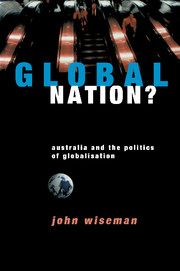Book contents
- Frontmatter
- Contents
- Abbreviations
- Acknowledgments
- 1 Introduction: Australia and the Politics of Globalisation
- 2 Breaking the Spell? Understanding Globalisation
- 3 Transforming the Global Economy? Trade, Capital and Power in the Late Twentieth Century
- 4 Onto the Global Racetrack? Globalising the Australian Economy
- 5 The Price of Competitiveness? The Social Impact of Globalisation on Australia
- 6 Wired to the World? Australia and the Globalisation of Media and Information Technologies
- 7 Nowhere to Hide? Australia in the Global Environment
- 8 Where in the World? Transforming Australian Political Relationships and National Identities
- 9 Alternative Strategies? Thinking and Acting Globally and Regionally
- 10 Alternative Directions? Thinking and Acting Locally and Nationally
- 11 Conclusion
- Notes
- Bibliography
- Index
2 - Breaking the Spell? Understanding Globalisation
Published online by Cambridge University Press: 20 May 2010
- Frontmatter
- Contents
- Abbreviations
- Acknowledgments
- 1 Introduction: Australia and the Politics of Globalisation
- 2 Breaking the Spell? Understanding Globalisation
- 3 Transforming the Global Economy? Trade, Capital and Power in the Late Twentieth Century
- 4 Onto the Global Racetrack? Globalising the Australian Economy
- 5 The Price of Competitiveness? The Social Impact of Globalisation on Australia
- 6 Wired to the World? Australia and the Globalisation of Media and Information Technologies
- 7 Nowhere to Hide? Australia in the Global Environment
- 8 Where in the World? Transforming Australian Political Relationships and National Identities
- 9 Alternative Strategies? Thinking and Acting Globally and Regionally
- 10 Alternative Directions? Thinking and Acting Locally and Nationally
- 11 Conclusion
- Notes
- Bibliography
- Index
Summary
Globalisation is a word suitable for a world without illusions, but it is also one that robs us of hope … Many over-enthusiastic analysts and politicians have gone beyond the evidence in over stating both the extent of the dominance of world markets and their ungovernability. If this is so, then we should seek to break the spell of this uncomforting myth.
Paul Hirst and Greg ThompsonThe argument that globalisation is certainly inevitable and probably desirable has become dominant among many of the most powerful players in Australian political life over the last ten years. In 1995, for example, the conference proceedings of the Commonwealth Government National Strategies Conference argued that,
on globalisation, nowhere was there a ‘Little Australia’ perspective. The force and inevitability of continued internationalisation was recognised and accepted from all quarters as was the potential for deriving major benefit from pursuing a global orientation for the country's affairs. What is now recognised as unavoidable, has also become a strongly shared objective, that is, for Australia to develop fully as a global nation to achieve its national goals.
In the Cabinet rooms of Australian governments, the boardrooms of Australian corporations or the meeting rooms of Australian trade unions, similar language and assumptions can be heard over and over again. Often the claims made are surprisingly simple. We might hear that globalisation is basically about economic openness and competitiveness.
Information
- Type
- Chapter
- Information
- Global Nation?Australia and the Politics of Globalisation, pp. 11 - 25Publisher: Cambridge University PressPrint publication year: 1998
